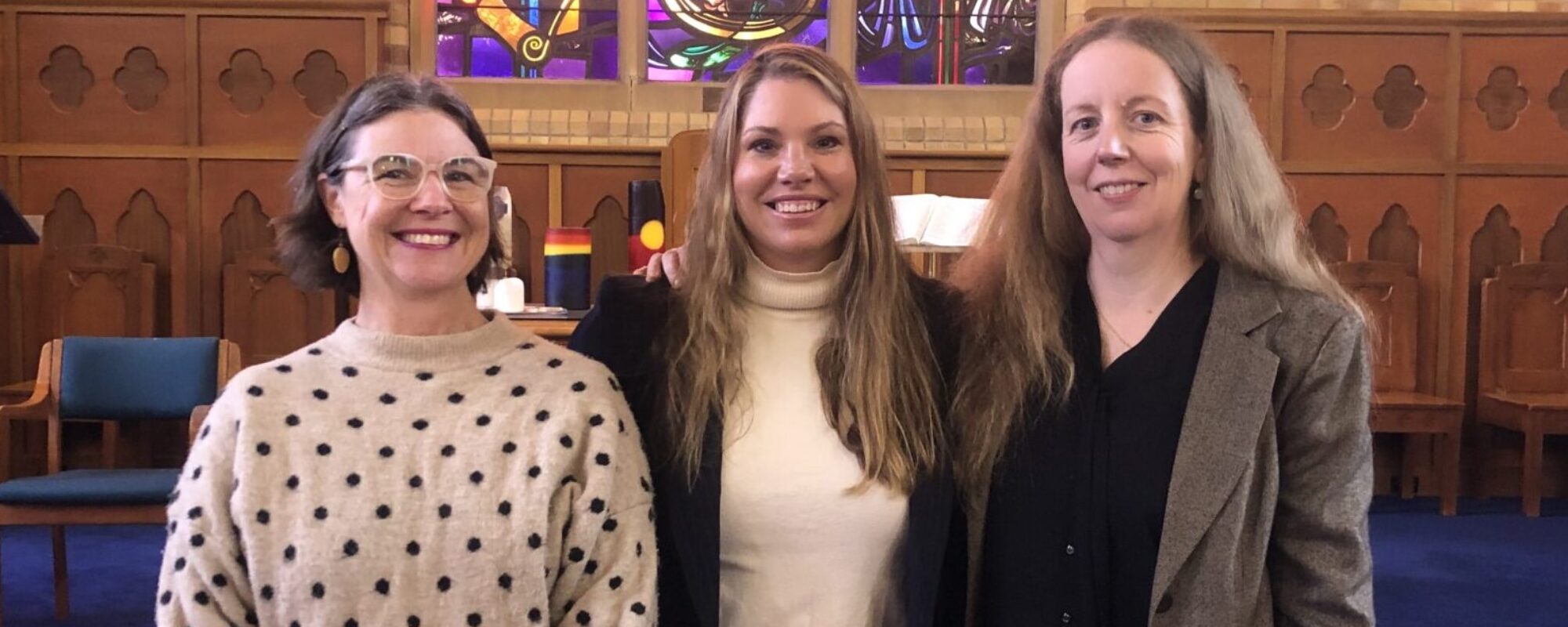From the Chaplains
Once upon a time…
1 Samuel 1:1-28
Human beings are hardwired to tell stories, share stories and learn from stories.
The way that we make sense of our lives is through stories and the deepest learning and wisdom is to be found in stories that are not about us, exactly, but are about people like us.
‘Once upon a time there was a woman …’
This term, our theme for Chapel is ‘Raising Your Voice’. In each Chapel service, we will be looking at a woman’s story in the Scriptures – women who raise their voices when their voices have previously been silenced, women who speak up for justice and truth, and powerless women whom God chooses to carry special responsibilities.

Through the stories of these strong, courageous, sometimes outspoken, sometimes quietly determined women, our students will hopefully find inspiration and see that God’s Spirit of compassion and a desire for justice can move powerfully through their own lives, here and now, as well.
Because somehow, through God’s grace and powerful Spirit, we find a surprising number of women’s stories in the Bible. In an Ancient Near Eastern world run by men and in texts written by men, in both the Hebrew and Christian Scriptures we find women’s voices being raised all over the place, often in the most unexpected ways.
In those pages we read the stories and see the names of Sarah, Hagar, Rachel, Leah, Miriam, Rebekah, Rahab, Esther, Naomi, Ruth, Deborah, the Samaritan woman at the well, the bleeding woman, the woman who anointed Jesus, Mary, Martha, Mary Magdalene, the woman of Canaan, Priscilla … and many more.
Throughout human history, [His / story], women have usually occupied the margins. Yet in God’s story, time and time again, they are put front and centre.
Once upon a time there was a woman called Hannah…

Next week in Chapel, we will look at the story of Hannah. I named my eldest daughter Hannah, partly because it derives from the Hebrew חֵן which means ‘Grace’. Also because in English it’s an anagram and I thought that was cool.
Later, when I read the story of Hannah in the book of 1 Samuel, I was even more glad I had chosen this name for my first-born. Because in this story Hannah is represented as an incredibly strong, gracious and faithful woman. When placed in the most powerless of circumstances, she found a way to maintain her dignity, find agency and raise her voice.
The way that she raised her voice was through prayer.

In the eyes of her society, Hannah was a complete failure, because she had not been able to have a baby.
She had a kind husband, called Elkanah. Elkanah had a second wife, Peninnah. The writer of 1 Samuel tells us, with no wasted words, at the beginning of the book;
“Peninnah had children, but Hannah had none.”
As is typical of ancient Hebrew stories, what is not said here is significant. I love the artistic sophistication of the Hebrew biblical narratives – so much meaning is conveyed, or hinted at, so economically; often with much word-play as well.
You could say (and excuse the pun) that this line is pregnant with meaning. Its balanced structure and deliberate emphasis of “none” as its brutal conclusion expresses oh-so exactly the pain that Hannah is enduring day after day, year after year, sharing a house, a husband and a life with Peninnah, who has many children. The comparison between the two women would have been a constant and inescapable torment to Hannah.
We are told – twice – that “the Lord had closed Hannah’s womb”. The repetition of this phrase tells us that this is an important detail. It’s a painful detail, one that has defined Hannah’s whole sense of self as an Israelite woman. How can she leave her mark on the world, be heard and remembered, if she has no children? What was the point of her life?
The narrator goes on to tell us that Peninnah (who in English translations is called Hannah’s ‘rival’ or ‘adversary’; צָרָה is the Hebrew word for ‘co-wife’) deliberately taunts and mocks Hannah for her barrenness, triumphing in her own fertility and so increasing Hannah’s anguish. Peninnah is especially cruel to Hannah during the family’s annual trips to Shiloh, to offer sacrifices at the temple.
In modern psychological terms, Hannah is experiencing deep depression. She stops eating. She weeps endlessly. She is in deep distress.
But she never stoops as low as Peninnah wants her to, to fight for supremacy as ‘best co-wife’. She never takes the bait from the other woman, despite her pain and humiliation – and with this gracious restraint and dignity, she busts a female stereotype. As her name suggests, she is gracious to the end.
During one of the family’s annual pilgrimages to Shiloh to offer sacrifices to God at the temple, after another painful sacrificial meal during which she is again mocked by Peninnah, something changes within Hannah.
The narrator tells us, “Once when they had finished eating and drinking in Shiloh, Hannah stood up.”
Again, the economy of words helps to create the quiet drama of this moment. Hannah’s had enough. She can’t bear it anymore and it’s time to take action. Something shifts within her and she takes a stand – literally.
She is overwhelmed by anger, distress, fear, anxiety, frustration, confusion and grief. But she doesn’t take these feelings to her husband, or to her co-wife, or to the priest, or to any other human being.
She takes them directly to God.
Hannah goes into the temple and, in her anguish, pours her heart out to God. She doesn’t follow the traditional Israelite religious practice of asking the priest of the temple to intercede for her or to offer a sacrifice. She does it her way. It’s her moment and her relationship with God. She raises her voice.
It is a prayer straight from the heart, from creature to Creator. From powerless to Powerful. She doesn’t use elegant phrases or fancy words. Her prayer is raw and honest, because she knows that God can handle all of her grief, anger, pain and suffering. In this prayer, Hannah shows her strength, vulnerability and her genuine faith in God.

In desperation, Hannah makes a deal with God. She says, ‘God, if you give me a child, I will give that child back to you. The very thing that I have longed for the most, if you loan me that thing, that is a gift from You, I will give it back to You’:
”10 In her deep anguish Hannah prayed to the Lord, weeping bitterly. 11 And she made a vow, saying, “Lord Almighty, if you will only look on your servant’s misery and remember me, and not forget your servant but give her a son, then I will give him to the Lord for all the days of his life, and no razor will ever be used on his head.”
Here, Hannah is making a commitment to God that she will ‘borrow’ the child only, and give him back to God as a Nazirite, in service to God for the rest of his life. (Nazarites distinguished themselves as particularly dedicated servants of God by not cutting their hair, among other things.)
To me, this prayer is an expression of Hannah wanting just to be heard, and seen, as a person. She has reached the point where having the child is not even the main objective anymore – because she is able to promise to give the ‘borrowed’ child back to God.
What is most important to her in this moment is to be heard and seen as an individual human being.
And we can see that she is transformed by this act of prayer. We are told that after pouring out her heart to God, “she went her way and ate something, and her face was no longer downcast.” She had found peace.
God hears Hannah’s prayer, and answers it. God sees Hannah and comes to meet her in her distress. In a beautiful use of language, God ‘remembers’ her.
19 Early the next morning they arose and worshiped before the Lord and then went back to their home at Ramah. Elkanah made love to his wife Hannah, and the Lord remembered her. 20 So in the course of time Hannah became pregnant and gave birth to a son. She named him Samuel, saying, “Because I asked the Lord for him.”
Again, as is always the case in ancient Hebrew narratives, people’s names are symbolically significant. Hannah, the gracious woman, names her son Samuel (Shemu’el), which means ‘God has heard’. Another way of translating the Hebrew here is, “She named him Samuel, meaning, “I asked (sheʾiltiv) YHWH for him.”
So the name of Samuel, one of the most important men in Israelite history, actually names Hannah as the one who is heard by God.
When Samuel is 5 years old, Hannah keeps her promise to God and hands him over to the temple priest to be brought up there – once again showing incredible strength, resilience and integrity.
Hannah raised her voice, and God heard her. God remembered her. And now we, too, thousands of years after this story was written, also remember Hannah.
Not only for being the mother of Samuel, who as a leader brought unity and order to the entire Israelite nation, but for herself and for her words – for her prayer to God in which she quietly and graciously raised her voice.
Once upon a time there was a woman called Hannah who had no voice and had lost her self. But she raised her voice in prayer. God heard her, saw her, and she found her self.
Amen.
Edwina O’Brien
Assistant College Chaplain

